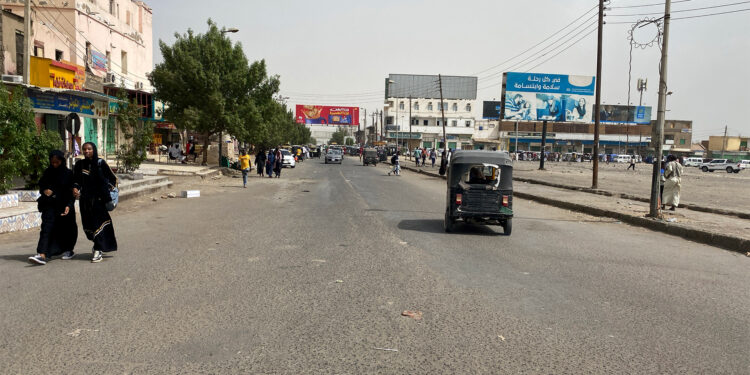With the beginning of each day, questions come to Saeed Youssef’s mind as he prepares to go to his office in one of the government departments in the city of Port Sudan, eastern Sudan. Questions about the costs of living and how he will face them with his salary, a percentage of which has been deducted since the beginning of the war in April of last year. He no longer receives more than about $50, which is barely enough to cover his needs for a few days as a single young man in his thirties.
Youssef does not have many answers because they are linked to factors beyond his control, but he is moving within the available scope in search of an opportunity to increase his income, which collapsed after the beginning of the war.
The situation is no different with his friend Mohamed Ali, whom we met while he was working as a rickshaw transport service for citizens, looking for additional income after his purchasing power declined due to a reduction in his salary from his government job.
Ali says that the cost of living has increased exponentially, and employees like him have no choice but to look for additional work to ease the burdens and obligations of life.
The situation of Saeed and Mohammed Ali is a reflection of the reality of the official figures regarding the economic situation of the country, which has been groaning under the burden of war for nearly 15 months.
Collapse indicators
In turn, economic expert Hassan Ayoub monitors the most prominent effects of the war in the deterioration of citizens’ purchasing power, with the inflation rate rising by about 140% over the past year and a significant increase in prices that reached 5 times in some cases. For example, it was possible to rent a suitable house in Port Sudan for 100 thousand pounds, and today the cost of renting the simplest house on the outskirts of the city may reach 500 thousand pounds (official exchange rate: about 600 pounds to the dollar, and rises to 1900 pounds on the black market).
The economic expert explained that the minimum guaranteed income in Sudan, estimated at 35 thousand pounds, only covers a small portion of the needs, noting that a family of 5 people will need about 20 thousand pounds per day to cover basic needs, without mentioning emergencies such as illness.
He pointed out the absence of accurate estimates of the war’s losses, and said that some international reports spoke of Sudan incurring losses of about $100 billion, and the number is likely to rise as the war continues.
In a reading of the major indicators of the Sudanese economy, the Sudanese Minister of Finance, Gibril Ibrahim, confirmed that the economic situation is bad. He said that the state’s revenues have declined by more than 80% and exports have decreased by more than 60%, accompanied by great pressure on the local currency due to the high demand for imported goods to compensate for the goods that were produced by the factories that stopped working.
The minister pointed out that expatriate remittances have stopped, and oil production has been affected and declined from 55,000 barrels per day before the war to 18,000.
Employee salaries
Ibrahim spoke about the challenges facing the ministry in providing the appropriate budget to guarantee the salaries of federal employees and the regularity of their payment, even after taking a decision to grant only 60% of salaries to employees of a number of government agencies.
Despite these difficulties, Gibril Ibrahim says that his ministry has not given up thinking about the post-war period by establishing a committee headed by the Minister of Finance to develop a reconstruction plan that includes enhancing Sudan’s various resources and establishing strategic relations with various countries.
Economic expert Hassan Ayoub believes that Sudan needs a “Marshall Plan” to rebuild what was destroyed by the war, and he warned of the need not to repeat the mistakes of the past, most notably concentrating economic activity in the Khartoum area.
Ayyoub adds that after the war broke out in that region, the movement of factories that used to supply Sudan with most goods was paralyzed, and therefore factories must be distributed according to the nature of Sudan’s regions and their characteristics. For example, it is not reasonable for oil factories in Khartoum to be hundreds of kilometers away from the areas that produce agricultural materials that go into that industry, according to his expression.
The expert links the success of any future economic plan to the need to reach a political consensus on a national project that guarantees the stability of the country and the peaceful transfer of power, which will later allow for attracting foreign investments.
Ayyoub stressed that attracting foreign investments is necessary to exploit the many natural resources that Sudan is rich in, because local capabilities are unable to provide the necessary financial resources and appropriate technology to exploit those resources.
He nominated a number of sectors to be the main source of resources needed to make the reconstruction plan a success, including the mining, marine fishing, ports and tourism sectors.



